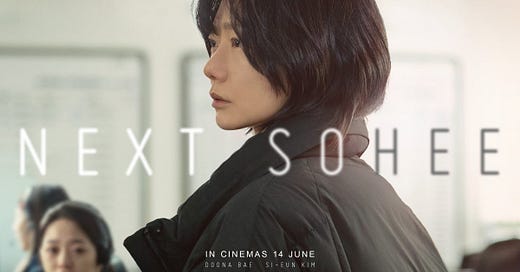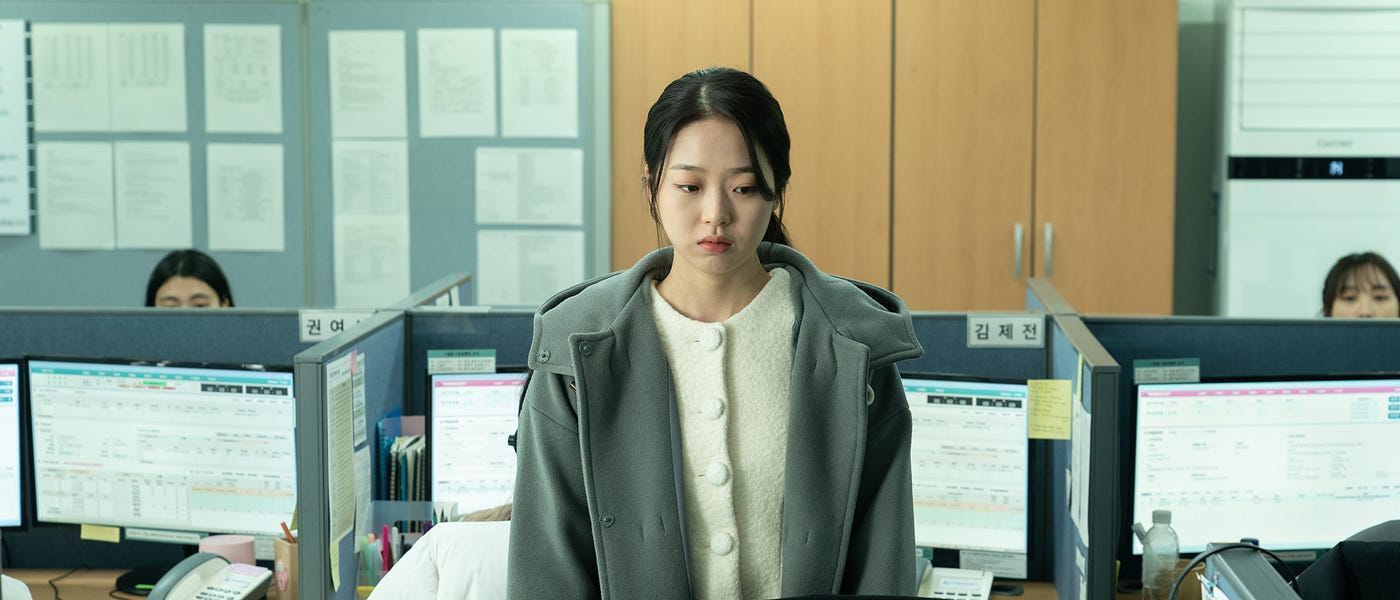The quiet tragedy of Next Sohee
A chilling watch that reminds us how society fails us before we've even become adults
“When you give everything to something, there’s nothing left for yourself.”
Next Sohee was one of the first indie films I watched this year and going in, I had no idea what to expect. What I discovered was a deeply troubling, slow-burn tragedy about youth, vulnerability and exploitation.
The story follows Sohee, a high schooler who takes on an internship at a call centre. At the start, she’s everything you’d expect from a spirited young person—she loves to dance, spends time with her best friend and is brimming with youthful optimism. The internship is presented to her as an ‘opportunity’ that will kickstart her career. Yet, the film slowly unveils an unsettling truth—that this job, meant to be her stepping-stone, ultimately becomes her undoing.
As Sohee begins her time at the call centre, we quickly see that she isn’t a natural fit for an office job. The corporate environment is clinical and impersonal, and she struggles with the rigid training sessions. While her high school self had been expressive and full of life, the call center’s atmosphere doesn’t just ignore individuality—it systematically stamps it out. Sohee becomes increasingly isolated, a state that seems almost by design. The workplace alienates her and her peers because it functions on a system that preys on vulnerability, especially in young girls.
As the film progresses, Sohee’s world shrinks. Her passion for dance fades, as does her smile. The daily grind, coupled with relentless pressure to ‘improve’ her performance erodes her sense of self. The monotony and isolation close in around her until her spirit is completely extinguished. By the end of her internship, Sohee is no longer herself—and this gradual wearing down is what ultimately leads her to take her own life.
Halfway through, the story shifts focus, following detective, Yoo-jin as she begins investigating Sohee’s death. Through Yoo-jin, we gain insight into how the system is set up to exploit people like Sohee—young, inexperienced, and full of hope for the future. The system sells dreams to young people while quietly suffocating them in roles that are not only mundane but also emotionally draining and dehumanising. By the end of the film, we realise that Sohee’s tragedy is part of a wider, disturbing reality: a societal machine that turns bright, hopeful students into lifeless, ‘productive’ adults, often with little concern for their well-being.
Perhaps what hit me hardest is that Next Sohee is inspired by a true story, based on a student in South Korea who took her own life during a work placement. Even more terrifyingly, if you were to remove Sohee’s final act, her experience would still be a common one—not only in Korea but worldwide. The relentless cycle of ‘clock in, clock out,’ of soul-crushing work that offers neither satisfaction nor fulfilment, resonates far beyond the confines of one country’s borders.
“They only see numbers, not people.”
Despite its slow pace, Next Sohee uses its quietness to convey the oppressive silence of Sohee’s experience, the slow drain of her individuality, and her initiation into an adulthood defined by dull, repetitive work. It’s a story about how so many young people are being ushered into a life that values productivity over humanity and compliance over creativity.
The performances in this film bring the story to life with a subtlety that feels painfully real. The actors convey complex emotions without needing elaborate dialogue or grand gestures. In particular, the film captures the weight of staying silent in a toxic environment, feeling compelled to endure for the sake of ‘respect’—whether for one’s elders, the school, or society at large. Although there were moments when the writing felt a bit heavy-handed, the overall story remains grounded, and the actors’ performances bring a powerful realism that transcends any shortcomings.
As I left the cinema, I felt a profound sadness for Sohee, a sentiment I still share (and reflect on) months later. Her story lingers because it’s not just her story—it’s a reflection of so many young people’s experiences worldwide. She was a young girl who had been promised an amazing opportunity, something that would set her on the path to success. Instead, it became a trap that drained her of everything she loved, leaving her with little more than an empty shell of promises unfulfilled. The film reveals a broken system that, instead of supporting young people, exploits them.
I couldn’t help but think back to my own university days, when we were all sold the ‘dream’ of high-paying jobs in finance, consulting, or tech. The internships and placements were supposed to be stepping stones to success, but in reality, they often revealed just how hollow that promise could be. I was lucky enough to step away from that path. Many others, however, feel trapped, with little choice but to continue. For them, there may be no turning back, only a life lived on someone else’s terms.
Next Sohee doesn’t offer easy answers, nor does it end with hope or redemption. Its powerful commentary on modern work culture leaves us haunted by the reality of what happens when young dreams and ambitions are sacrificed to a system that values productivity and profit over personal growth and human connection.






This was a very tragic film and I agree, to an extent it is relatable to us all. I think you captured the essence of the film perfectly. Enjoyed this read!
Depressingly relatable. I remember a soul crushing job. Having to log every minute of my time.